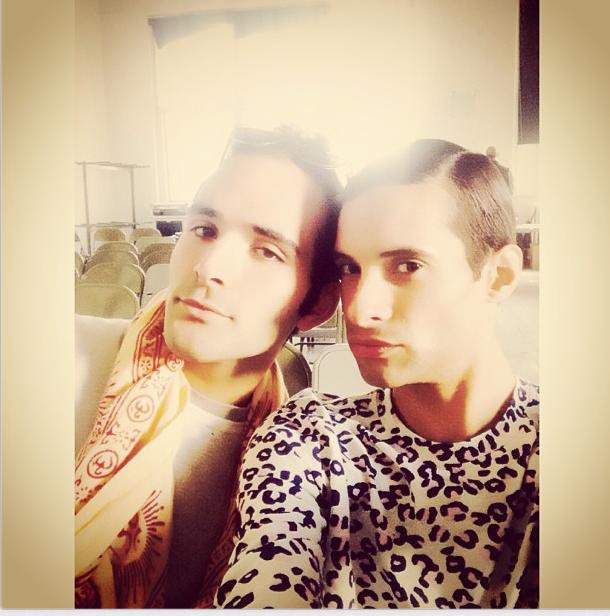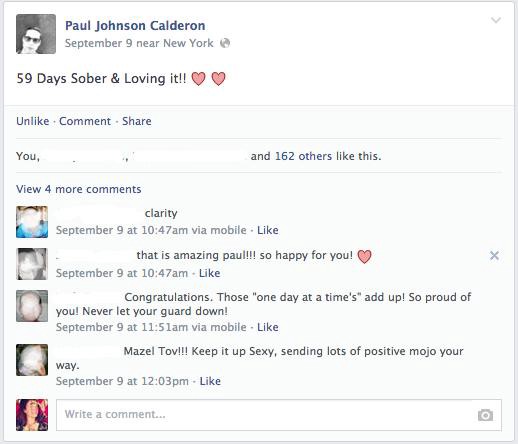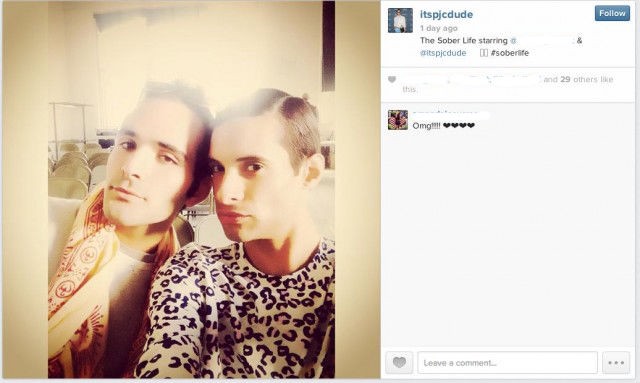“Status Update, I’m Sober”: An Interview with Paul Johnson Calderon
by Melissa Batchelor Warnke

Paul Johnson Calderon, a high school classmate, had fallen off my radar in the years since we’d graduated. The very little I knew about him was pieced together via Facebook — that he had at one point been a Vogue fashion assistant, that he was a bow-tie entrepreneur. I vaguely remembered he had been featured as a New York socialite in High Society, a CW reality show, but hadn’t had television at the time.
I was aware of Paul as many people were aware of him: as a bon vivant, someone gregarious, generous and charming. His Facebook page was full of playful selfies, with Paul in a bowtie, rings and fur, glamorously escapist and self-mocking in turn. So when I mindlessly scrolled through my newsfeed at the beginning of summer, I was surprised to see a serious life update.

It hit me again, as it often does, just how much of our lives we fail to disclose on social media. People don’t Instagram the jars of fluff they consume in bed while wailing over a breakup. You don’t tweet the play-by-play of your bankruptcy settlement. For God’s sake, do not admit discomfort or acknowledge ambiguity. Who can “like” that?
Paul was turning the nature of social media on its head, celebrating his attempt to tackle a difficult patch of life. And he wasn’t the first of my network of “friends” to declare his sobriety in this way. I started thinking about what would motivate someone to subvert traditional models of discretion or anonymity by getting sober in full view of the public. I reached out to him via Facebook message, and then we spoke on the phone.
Paul is the first in an interview series: “Status Update: I’m Sober,” where recovering addicts speak about the way in which they have used social media as a tool in recovery. He’s continuing to share his life in recovery on Twitter and Instagram.
What has happened between when I last saw you and now?
I was working in magazines for a long time in New York and got caught up in a certain pace of lifestyle. You go out to these things for work; there’s liquor everywhere, there’s drugs everywhere. It’s unfortunately one of the dark sides synonymous with the industry, and a lot people get sucked in. Also, I had been very well behaved for a long time, and once I moved to NYC and garnered some sort of popularity [from my reality show], drinking became a way for me to escape my insecurities and awkwardness, to be rebellious, just to be dark or different.
When did you know you needed help?
I’ve been living in NYC for five years and it took me six years of highs and lows and screwing up and doing stupid things to realize that I had a serious problem. About a month and a half ago, I took very rainy train ride to Boston to enter detox at McLean hospital. When I was discharged, I started SMART recovery, a cognitive approach to sobriety. It isn’t dogmatic at all. With AA, I felt very uncomfortable getting up and saying a prayer and hearing everybody’s sob stories. Within the 12 steps you render yourself powerless to a higher power. But now I feel that my sobriety has been empowering.

Had you been to rehab before?
I’ve tried to get sober a couple of times before, gone to various therapeutic things, yoga retreats. I hadn’t published any of that or told anybody. To be honest, the minute I got out of whatever sort of detox, I’d be like “OK, let’s party.” But when people know that you’ve been fucked up in the past, they’re way less likely to be like, “Hey dude, let’s go to the bar.” And now my whole family has stopped drinking in solidarity, and I started speaking to my father again after we hadn’t talked in a few years.
So now I can’t be secretive. I’ll look like a hypocrite. I’m going to have a bottle of water glued to my hand when I get back to New York and be “the sober boy.” I’d rather have that sense of safety.
How did you know this sobriety attempt was different?
When you’re 21 and 22, rehab is something like a vacation, and then you want to go back and party. Whether you get hospitalized, or a car crash, or almost die, you have to hit rock bottom for it to be real. And in the past, when I’d tried to get sober, my family were the ones to send me to places. This time it was me that made the decision.
Because, I’m in my late 20s. I felt like I had lost my powers. I’d started living off my parents, smoking pot during the day, watching movies. I quit my job. Even a quiet night in with Ben and Jerry’s was like, quiet night with Ben and Jerry’s and three bottles of wine from Whole Foods.
Living in New York, it can seem like just a normal thing. For a while I thought, “These people have such fun lives! They don’t really have to do anything.” But once you get to the rock bottom point, or see it: for example, the very last party that I went to in NYC was an event I had to cover. It was a liquor launch and, not to be ageist at all, but people in their 30s and 40s were getting shit-faced, running around to blow lines. I was like, “Shouldn’t you be at home with your kids?” It was the last nail in the coffin.
So this time, you told your friends and fans all at once. You were sure it was different.
The most terrifying part about going to McLean was thinking “Am I going to be less fun? Are people not going to like me as much? Am I still going to be the life of the party?” But social media allowed me to tell my friends, family and fans that I was going to be OK, that I was going away to do this.

What was the reaction?
When I first got to McLean, I was miserable. My one last Instagram before I went to admissions was of the main gate. I wrote “See you on the flip side.” When I got out, it had so many likes and comments.
When I posted it on my public account [Calderon has one private account and one “fan” account], I got like 135 likes, 15 messages that said “we’re so proud of you.” People think that social media is keeping us from actually interacting with one another, but I felt like I was connected to a broader community of people. When you’re in detox and rehab, it’s a tiny bubble where you’re focusing on your health and your sobriety. During phone time, I’d be like “Give me news of the outside world! What are the kids wearing these days?” And being able to share with people took away a lot of the scary. All these friends of mine came out of the woodwork saying, “I’ve been sober for this long, let’s do a movie night when you get back.” I felt like people were rooting for me.
How did you decide to tell your story publicly?
I like to think of myself as an open book and my career has been built up through Facebook. For me, social media was a catalyst to certain career ambitions. Not that I share everything — there are no nude pics in bathrooms — but I felt very comfortable. There’s a stigma to sobriety that you have to be crazy to do it. When I went to detox at McLean, all I thought about was Girl Interrupted and Sylvia Plath. People shouldn’t have to feel like they’re disgusting junkies wanting to get sober. I was in there with 21 year old girls addicted to heroin who were selling themselves in Quincy Market! I had struggled with alcohol and cocaine addiction — I was like “OK, I am really bad.” But then when I got there and realized I was actually not that bad, it was easier for me to tell my story.
And it’s like, making sobriety popular. Everything popular goes on on social media! [Laughs] A lot of people take their Facebook profiles and Instagram and they make it so that every second of their lives seems like this epic, next level crazy thing. And I wanted everyone to know that this was just as epic, next level and crazy for me. It’s not like I’m climbing the Himalayas with the Rolling Stones, but I’m posting about mentally climbing the Himalayas to sobriety.

Have you gotten any negative reactions?
A few friends called me and said, “Really? You’re putting this up there? It’s open now and everybody knows you had a problem.” If people didn’t know I had a problem before, they were just stupid. I have a handful of friends who are like, “I can’t believe you keep posting this stuff.” But half of New York is in a meeting or therapy at any given time.
What’s next for you?
I have the launch of my line in September, my art show coming up. Do I want to be fucked up on coke and not get any of it done?
I feel so much better, like I’ve taken 10 years off. I feel like a late teen frolicking in a field. I’ll post things like “I’m so happy for today.” It’s really scary if I count up all the times I could have died. I count my blessings now in the morning, even just to be able to get up and read and play with my dog.
Melissa Batchelor Warnke tweets @thewarnke. If you are interested or know someone who would like to be featured in the series, please contact mwarnke09 [at] gmail [dot] com. We’re happy to run the stories anonymously.